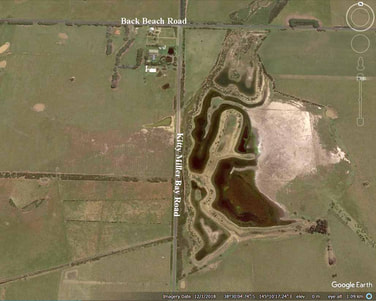 Google Earth map showing the man-made wetlands that would be a feature of the 'eco-retreat'.
Google Earth map showing the man-made wetlands that would be a feature of the 'eco-retreat'. A PROPOSED “eco-tourist retreat” at Ventnor that has attracted over 140 objections is shaping up as a test of Bass Coast’s new rural tourism strategy.
The $8 million proposal for the vacant 36-hectare site at 115 Kitty Millers Bay Road, on the corner of Back Beach Road, proposes a mix of units, houses, cabins and elevated tents for up to 96 guests, plus an information centre, restaurant and swimming pool.
The proposal is marketed as an eco retreat incorporating boardwalks and viewing platforms extending out into man-made wetlands on the site, which would be rehabilitated and re-vegetated as part of the development.
Phillip Island Conservation Society (PICS) president Jeff Nottle said the society would be lodging an objection. The main issue for the society is over-development of land zoned for farming and other environmental and landscape concerns.
The Ventnor application is likely to be considered at next month’s council meeting.
The councillors’ response will indicate how wedded they are to encouraging major tourism developments in the farming zone without a planning scheme amendment, as identified in the new Bass Coast Unlocking Rural Tourism Strategy, in the face of a massive resident backlash.
The Strategy, which was adopted in March, designated Special Use Zones on the state-significant southern coast at Newhaven, Ventnor and Kitty Miller Bay.
The Ventnor development proposal explicitly refers to the strategy, noting the resort would capture new tourism activities as the Victorian tourism market recovers from the Covid pandemic.
Mr Nottle said the proposal confirmed the society’s concerns on the rural tourism strategy. The society’s submission argued that the strategy incentivised investors with very little regard for negative impacts that large scale developments have on the natural environment and landscapes.
“It was a solution looking for a problem. The society put in a very detailed submission at the time. We took the view that the strategy was also very rushed and should have been held over until after the Distinctive Areas and Landscapes hearings.”
He said in considering the Kitty Miller Bay proposal, the council should be mindful of the decision by the Victorian Civil and Administrative Tribunal (VCAT) last month to reject a 4,000sqm building and cafe/restaurant in farm zone purported to cost $50 million for the National Vietnam Veterans Museum at Newhaven.
Despite unanimous support for the museum by Bass Coast councillors, the Federal Government and the State Government, VCAT ruled the project was contrary to the local strategic context,and farming zone objectives, would apply further pressure on adjourning farm land, was located outside the Council identified tourism activity locations and the scale and size was too obtrusive and would irrevocably transform the landscape and environment.
In March 2022, VCAT rejected a proposal for a caravan park at Forrest Caves, citing similar concerns about the impact on the environment.